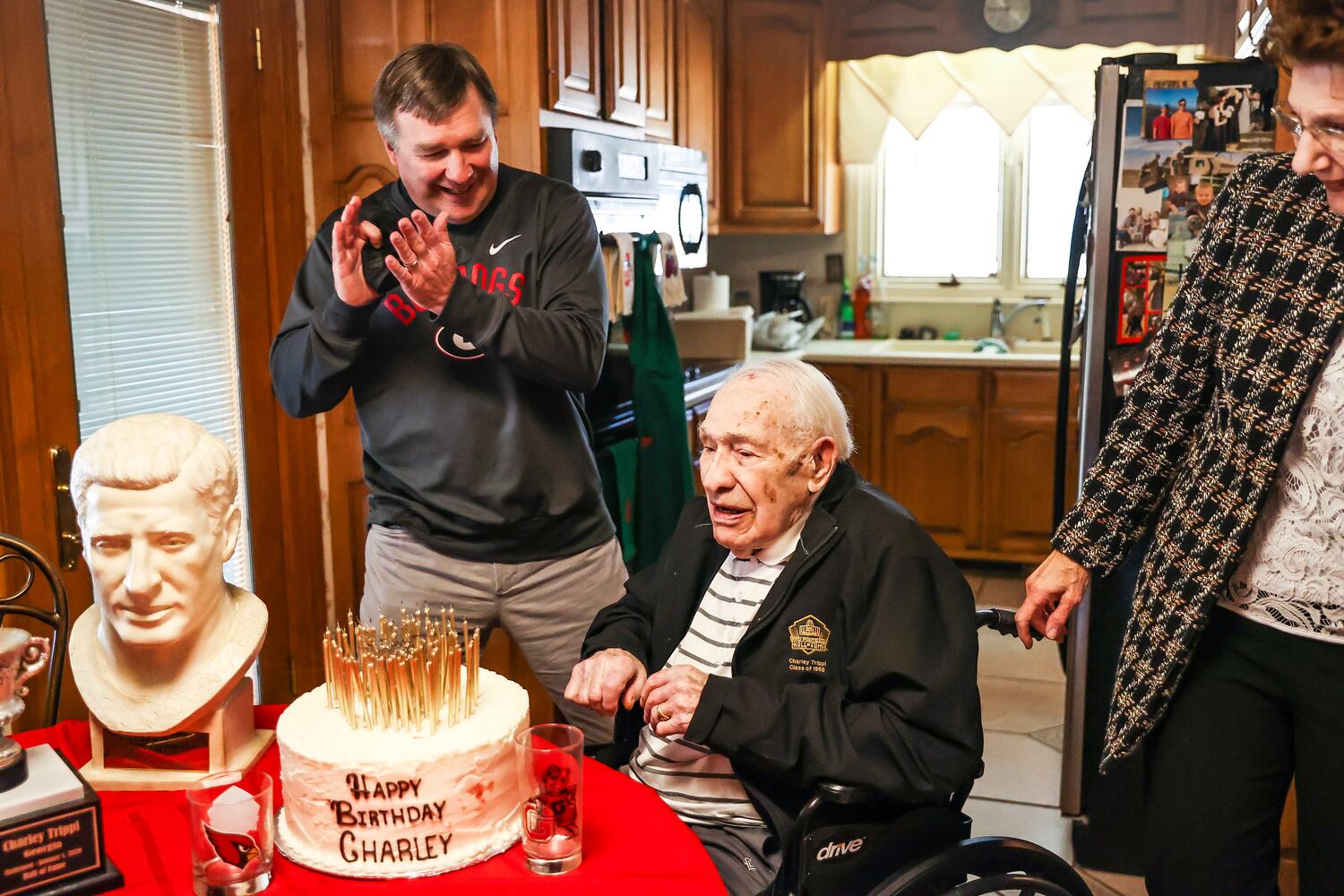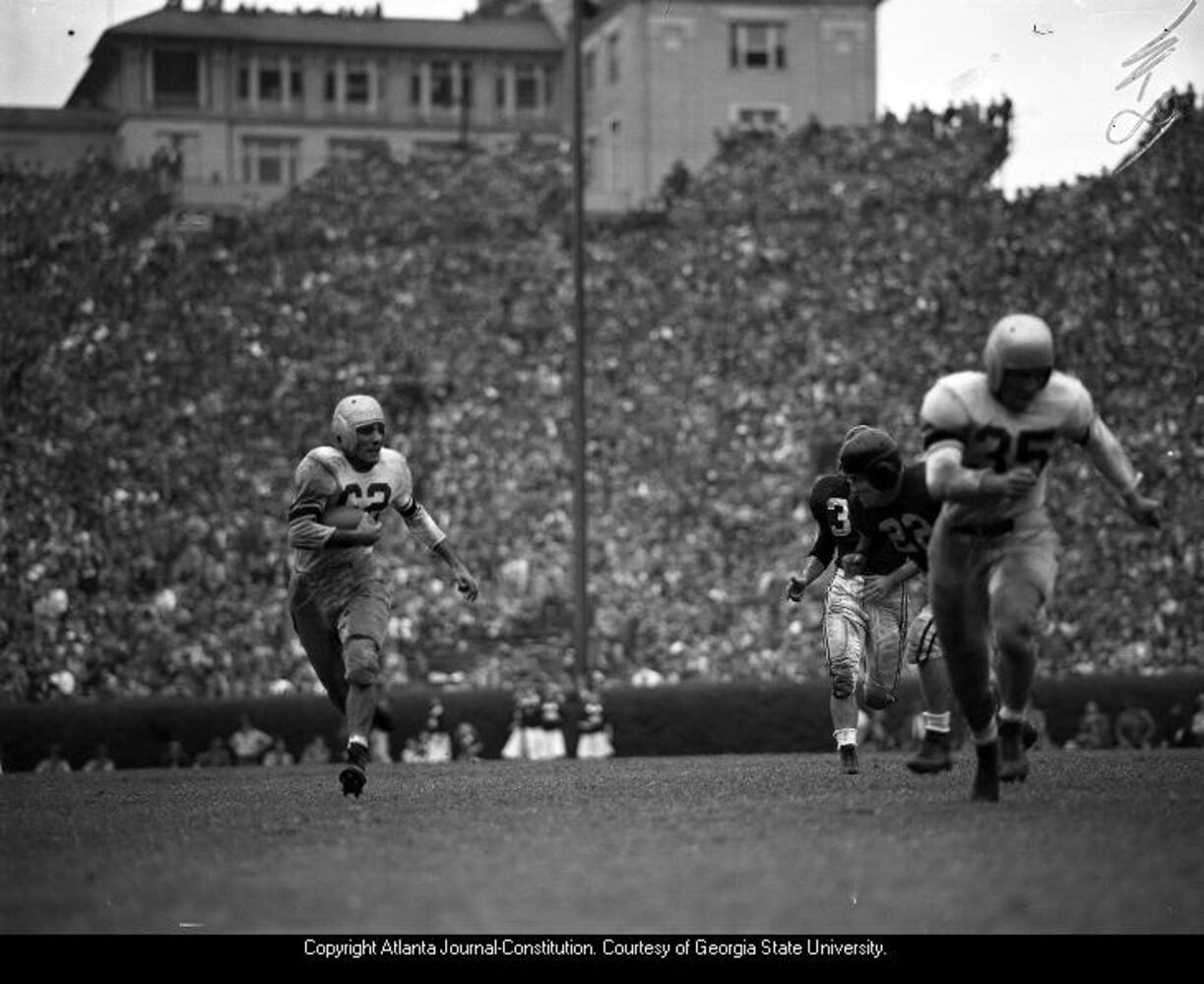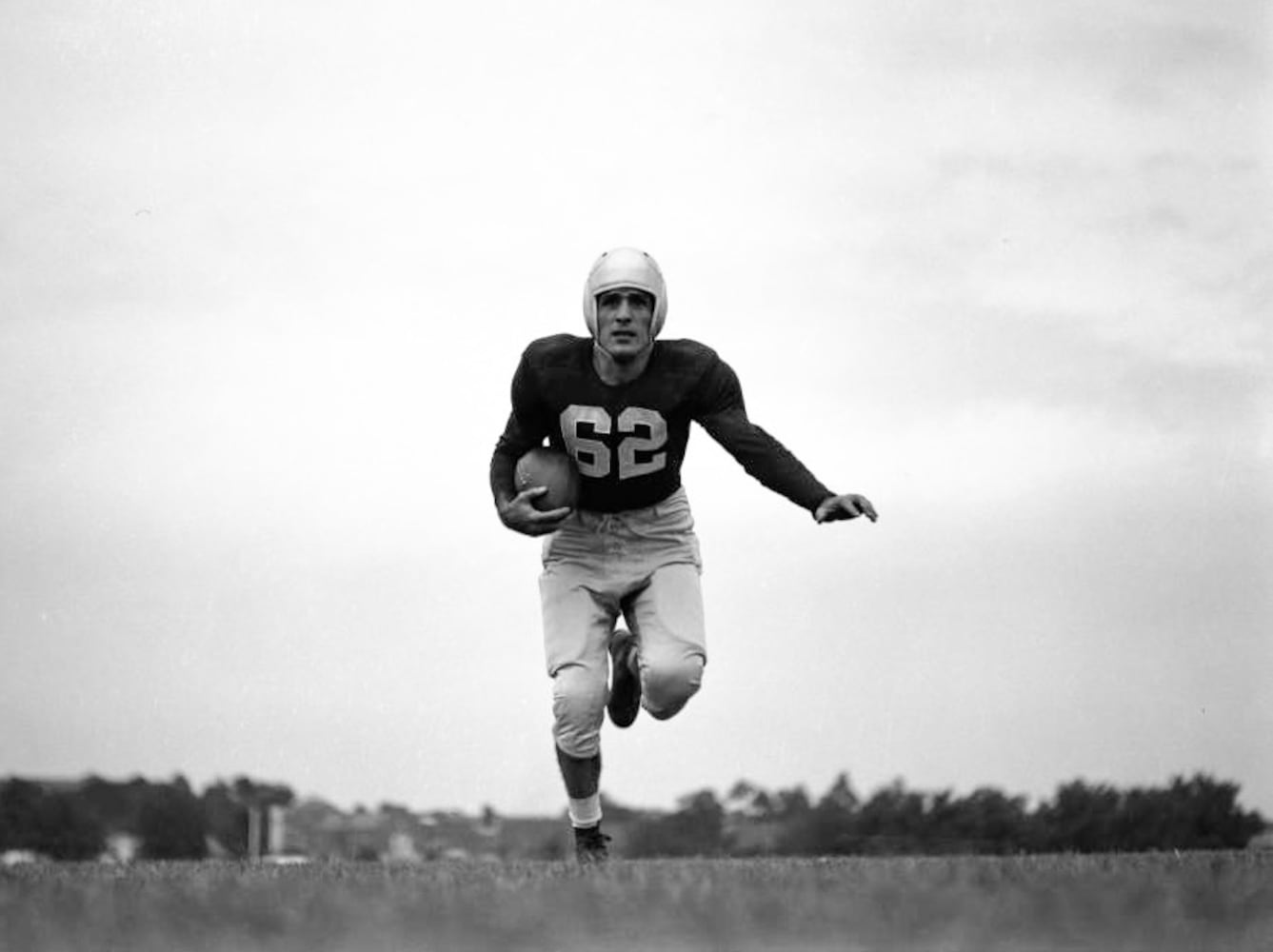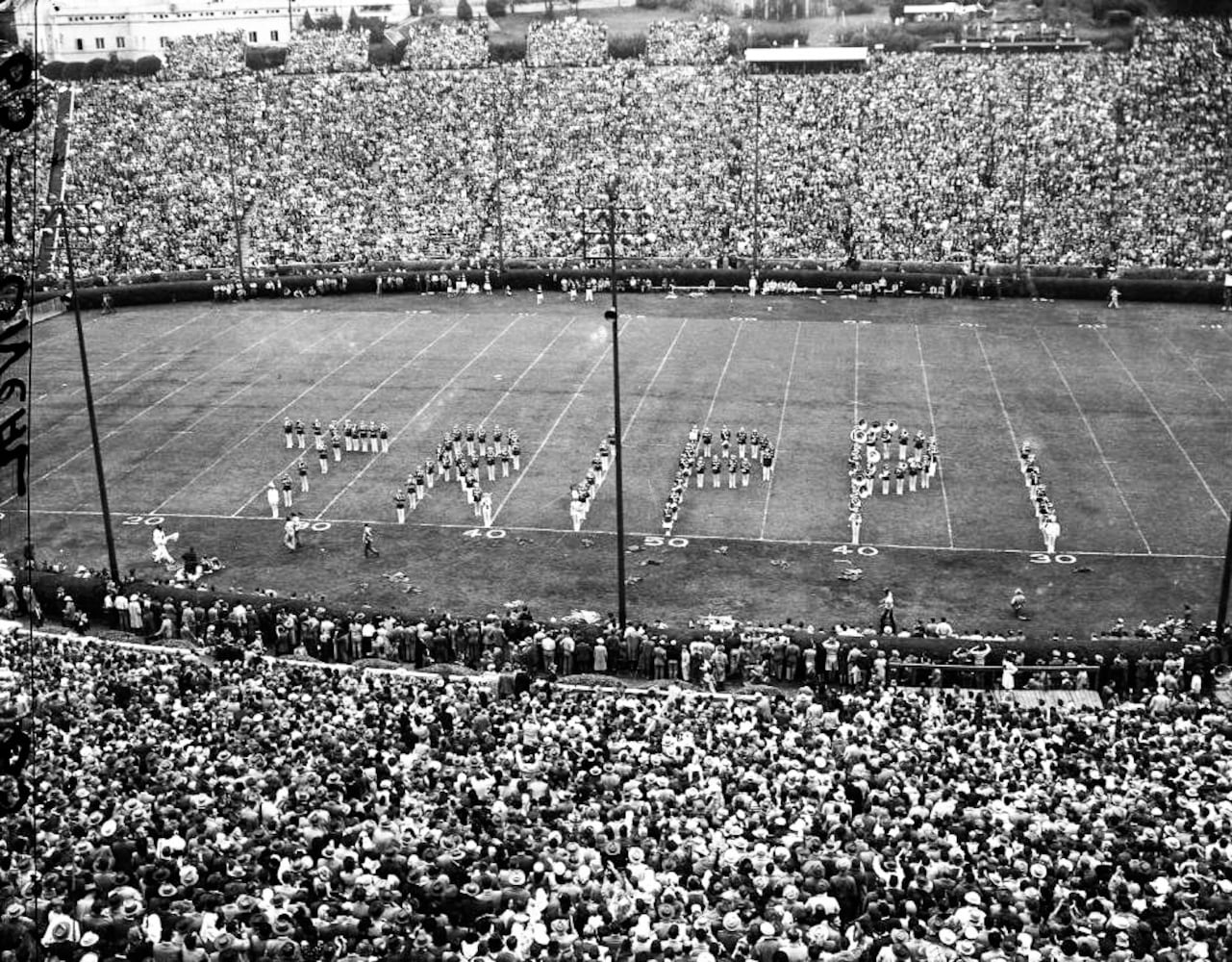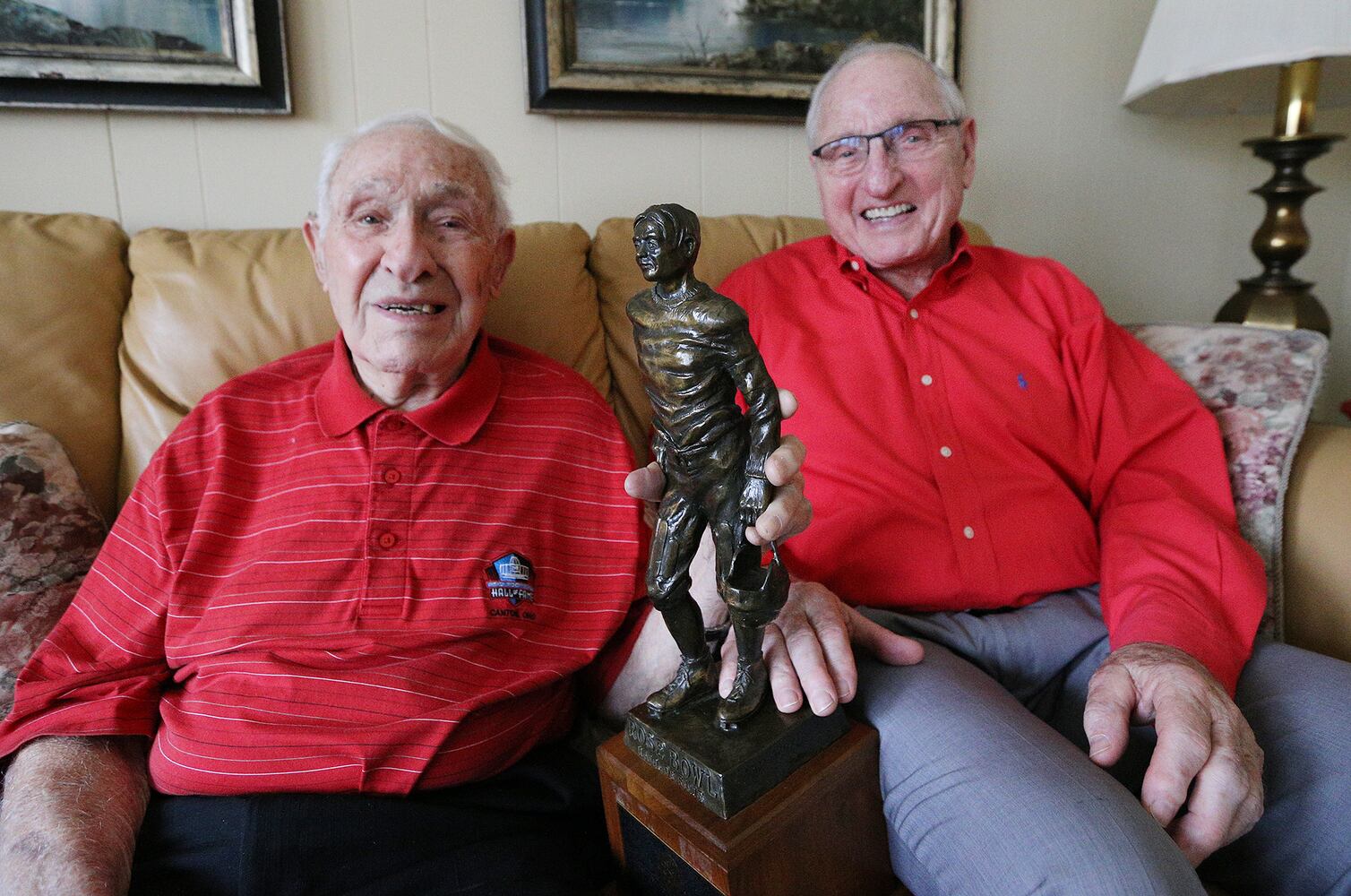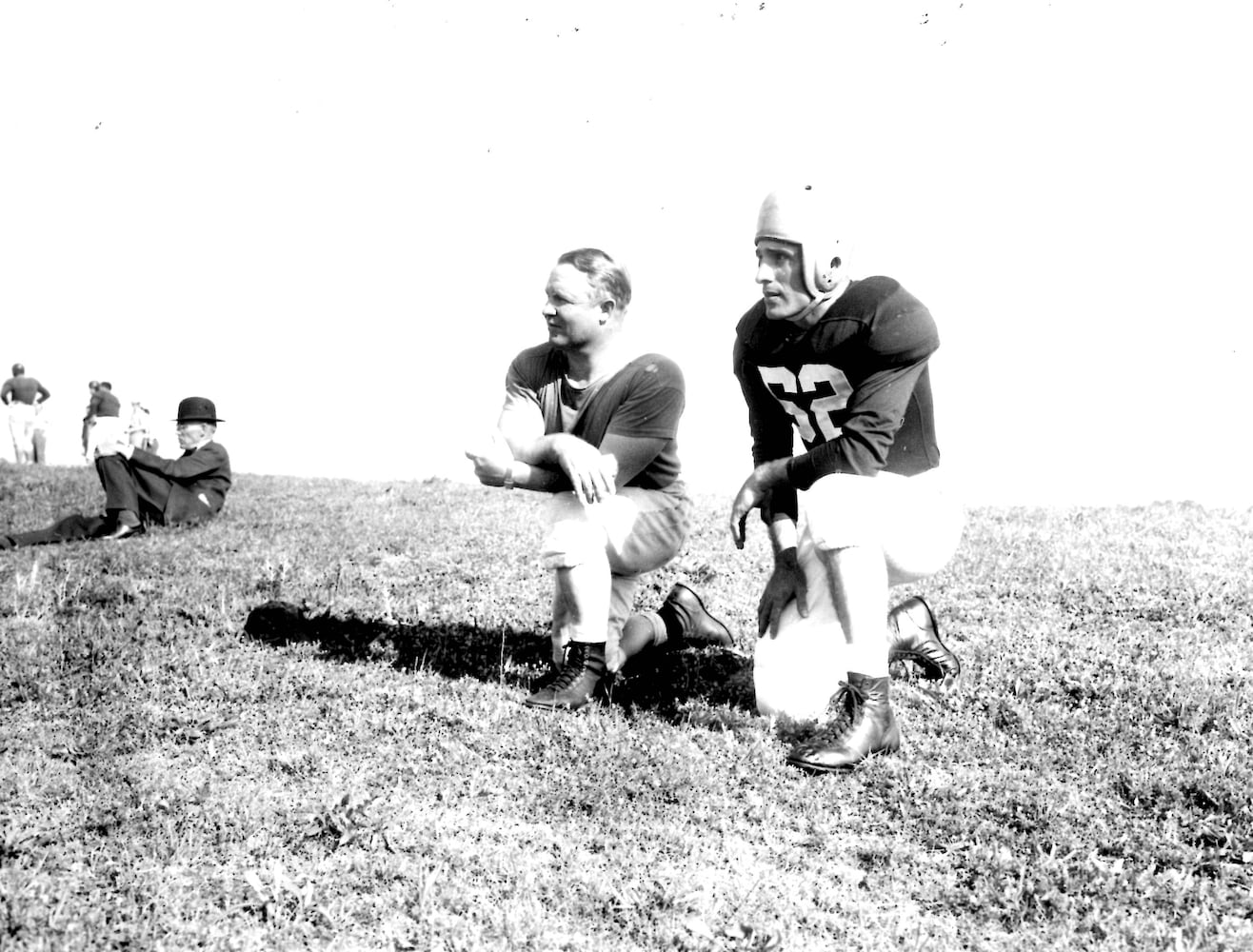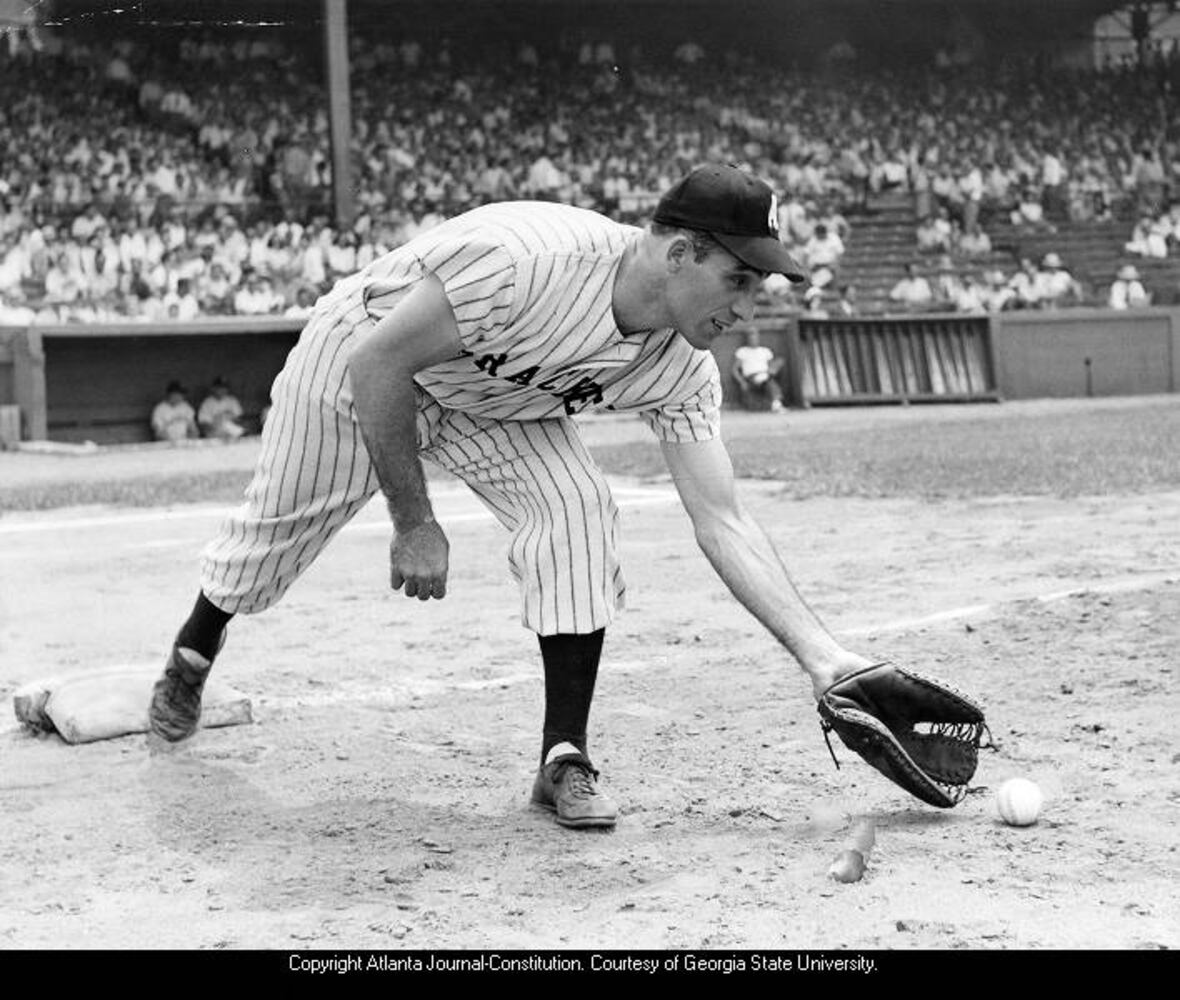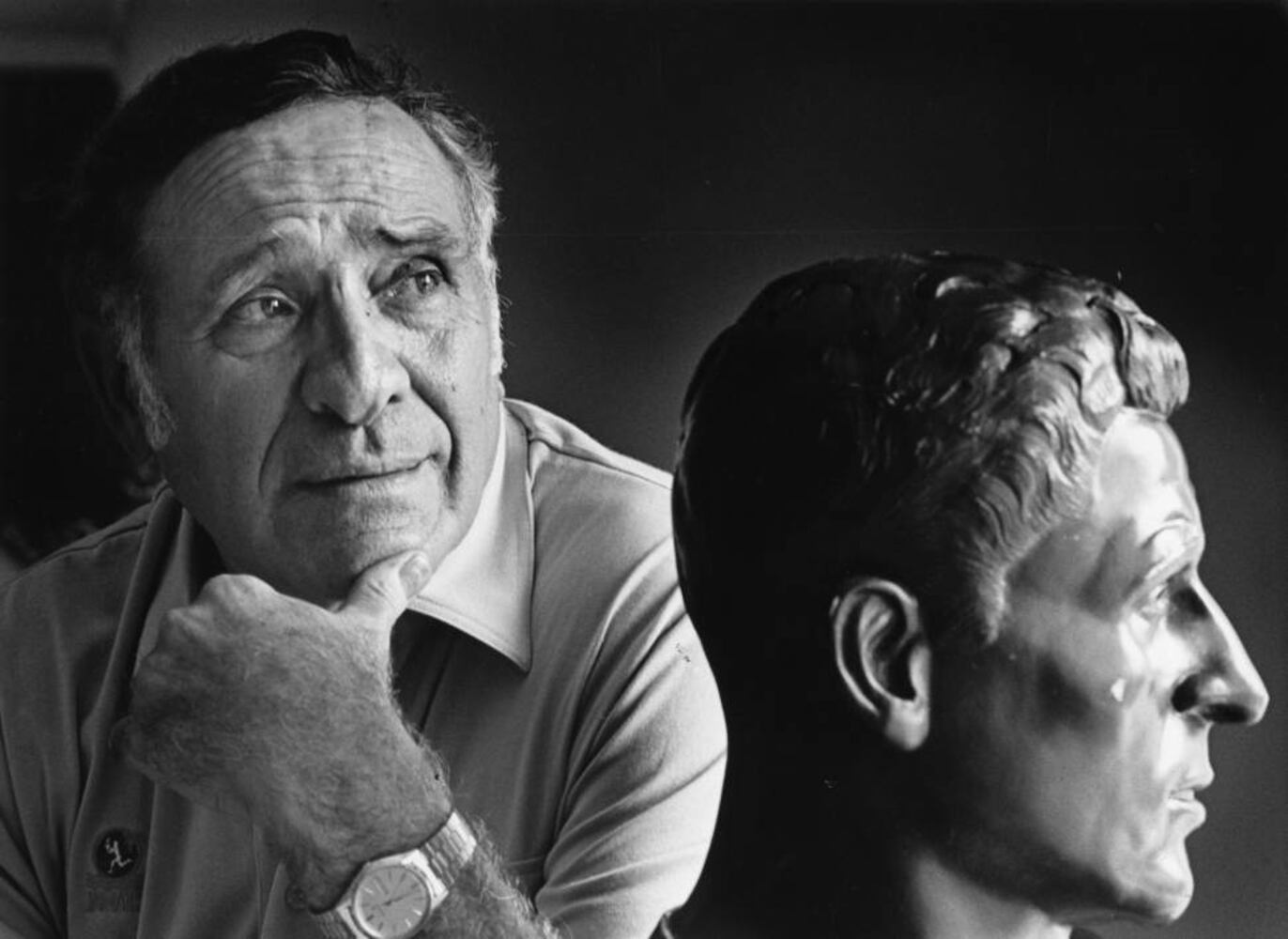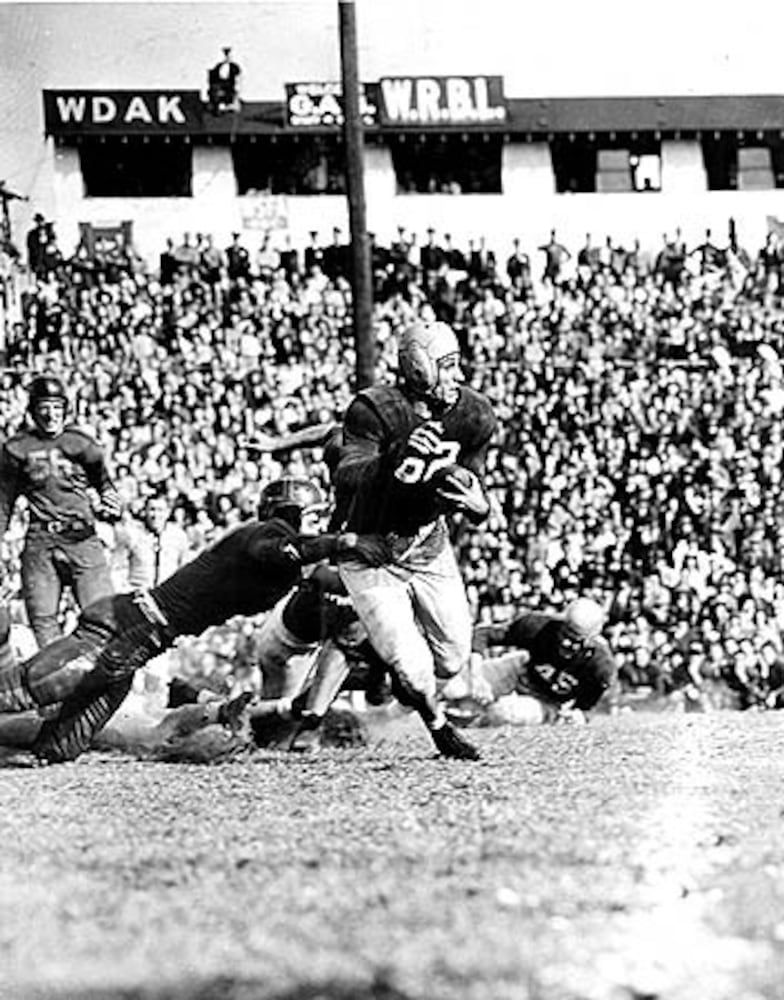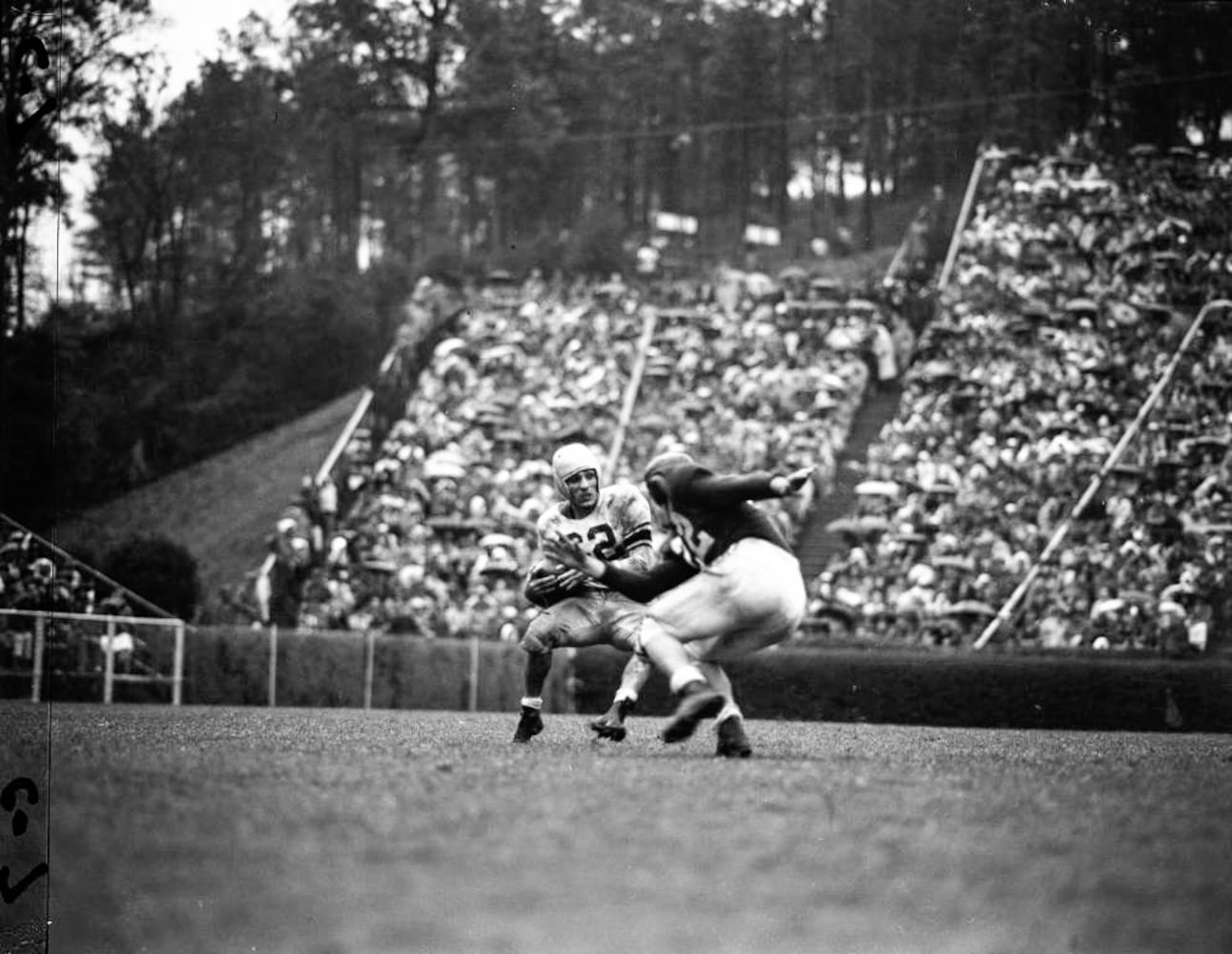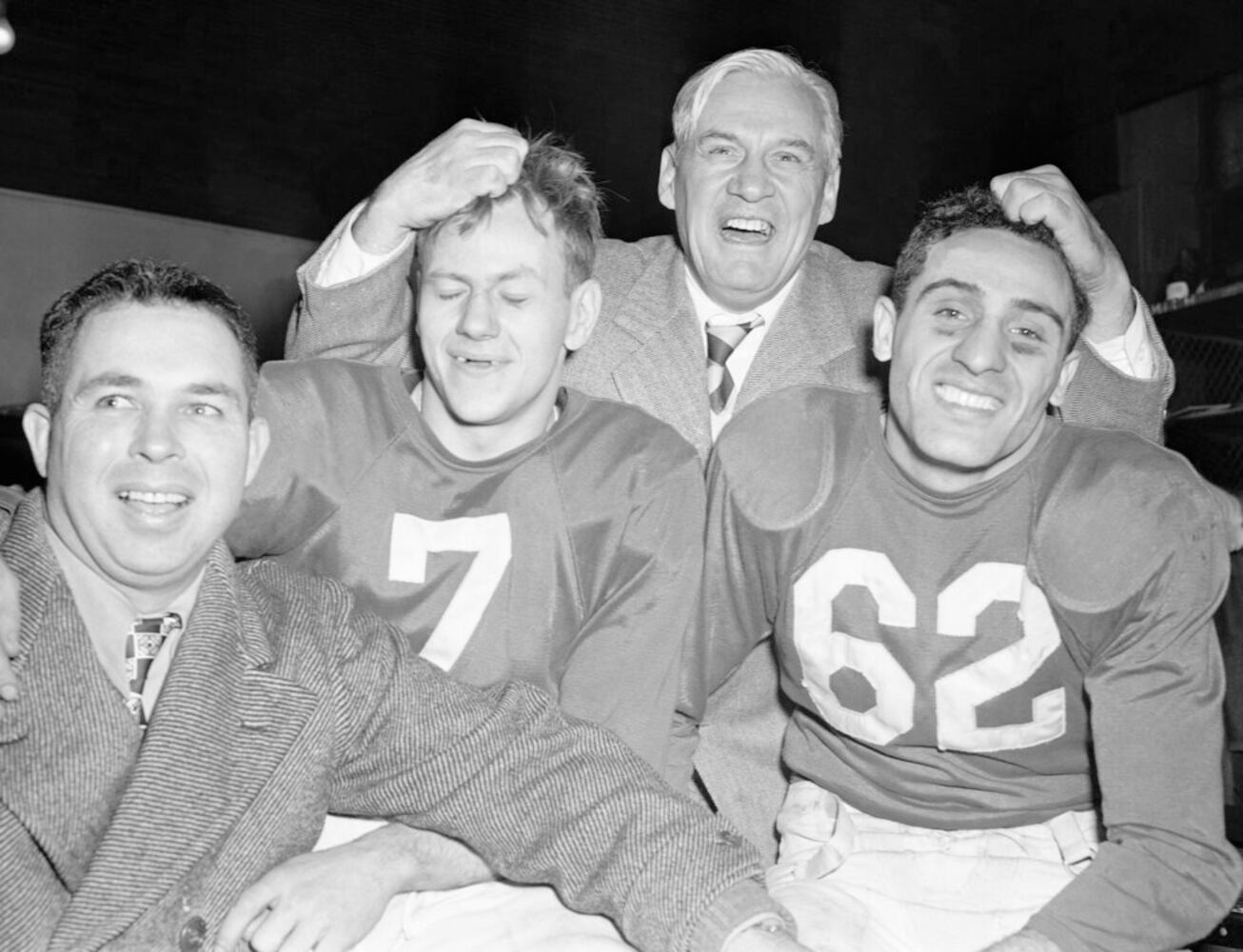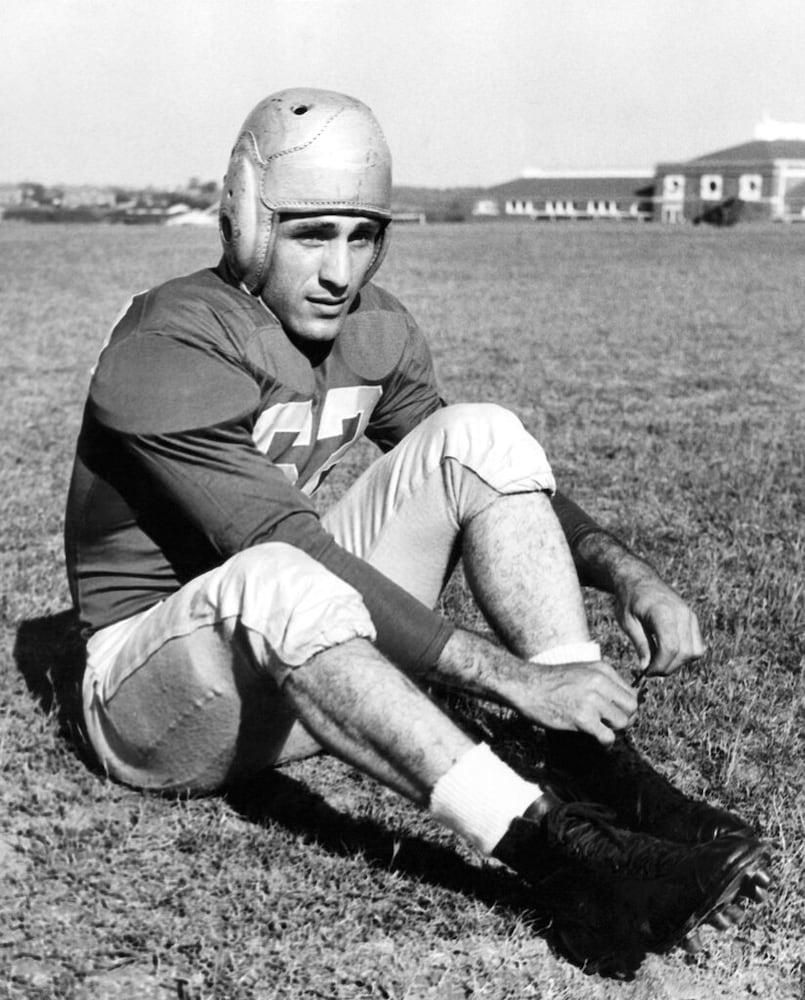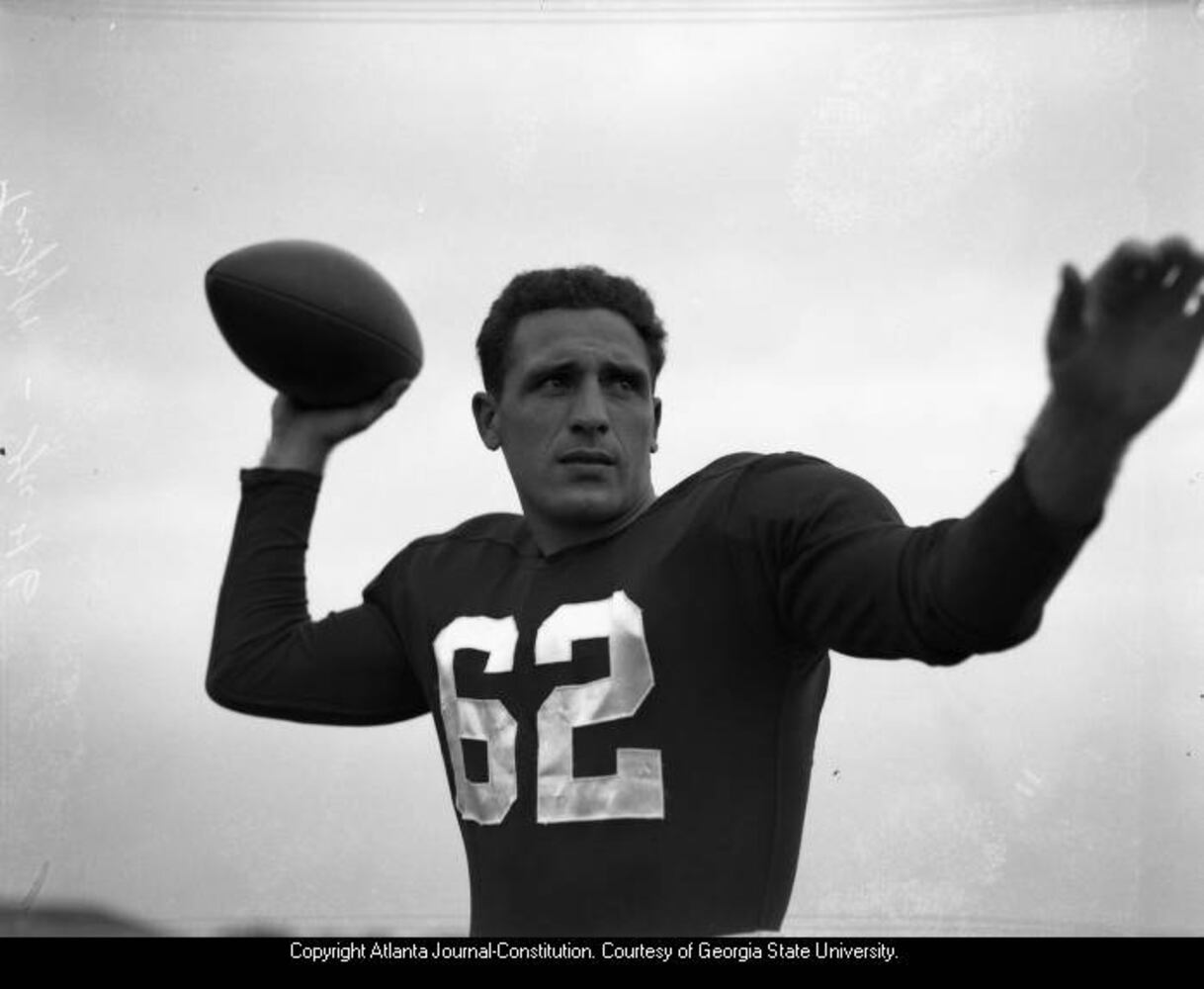Charley Trippi, who escaped the Pennsylvania coal fields to become what many consider the best all-round athlete in University of Georgia football history, never sought to make the game his life.
It was football that sought out him. And it had to wait in line.
Trippi died peacefully Wednesday morning at his home in Athens, UGA officials announced Wednesday afternoon. He was 100.
After helping Georgia to its first consensus national championship in 1942 as well as an undefeated season in 1946, Trippi found himself the focus of a historic bidding war that included a two-sport offer from the New York Yankees. When the NFL’s Chicago Cardinals landed him with an unprecedented $100,000 contract, Trippi was characteristically embarrassed. The linemen who protected the future Hall of Famer (college and pro football) were making $4,500 a year.
“I felt kind of guilty,” Trippi once confessed. “If I ever went out to dinner with them, I’d never let them pay.‘'
To measure Trippi’s abilities against the contemporary game is futile. Though he first excelled as a single-wing tailback, he later won the Maxwell Trophy for the best college player as a halfback when UGA coach Wally Butts switched to the T-formation. Throw in his defensive prowess — some argue UGA has had no finer safety — as well as his skill as punter and return specialist, and today’s colleges would invest three or four scholarships to fill as many roles.
He played at Georgia in 1941-42 and from 1945-46 after two years in the Army Air Corps. He made every All-American team in 1946 and finished second to Army’s Glenn Davis in the Heisman Trophy voting.
Credit: AJC file
Credit: AJC file
Though he would captain the 1946 Bulldogs to their first undefeated, untied season, leading the SEC in scoring and rushing, it was the 1942 national championship that established his reputation. He rushed for 130 yards in a Rose Bowl victory over UCLA, an experience that still gladdened him in his 80s.
“I played 58 minutes of that game. I enjoyed the trip,” Trippi said in 2007. “Paramount had a luncheon for us and we had all the movies stars. I sat next to Barbara Brittain and – oh, what’s her name? – Susan Hayward. I was right in the middle of those two.”
A fleet outfielder, Trippi played one year of baseball for the Atlanta Crackers after UGA before his nine-year NFL career with the Cardinals, leading them to a world championship in 1947.
Charles Trippi was born Dec. 14, 1921, in Pittston, Pa., so close to the tracks that his house stood on East Railroad Street. He was not pushed into football; he had to justify practice time to his coalminer father, an Italian immigrant who did not like or understand the game.
“Go ahead, you play,” Trippi recalled his father telling him. “But if you break one leg, I’ll break the other.”
A small but rugged kid, Trippi quit his high school team as a sophomore in 1937 when, as an unknown talent, he was denied a pair of cleats and was forced to practice in his work shoes.
At a coach’s urging Trippi returned as a junior and played guard, center and punter. According to Pittston lore, a botched punt got history rolling.
It was midway through the 1938 season. Trippi fumbled the snap, picked it up and ran. Eighty-two yards later, a star was born.
In 1939, “Triple Threat Trippi” caught the eye of former UGA tackle Harold Wayne Ketron, who managed a Coca-Cola bottling works in Wilkes-Barre, Pa.
“I was all of 158 pounds then, and Mr. Ketron told me if I wanted to play college ball, I needed to beef up a little,” Trippi said. “I went to LaSalle Military Academy on Long Island, and that was the turning point of my career.”
Ten pounds heavier, he accepted a scholarship to Georgia in 1941. He turned down Notre Dame, Fordham and West Virginia.
Why UGA?
“Well,” said Trippi, “I liked the stadium, the folks down there were friendly and there was the inducement of driving a Coca-Cola truck in the summer. Where I grew up, there were only two choices. You could go to work in the coal mines, or you could go to school and get an education. There was no way I was going to work in those mines.”
Trippi quickly became a star. After leading the Georgia freshmen to an undefeated season in 1941, he moved to the varsity in 1942, joining Frank Sinkwich, who would win the Heisman Trophy that year, to give the Bulldogs one of the most feared combinations in college football.
Trippi stepped in for the hobbling Sinkwich against undefeated Georgia Tech with a Rose Bowl bid riding on the outcome. He threw for two touchdowns and ran for another in a 34-0 rout.
That set up the greatest football thrill of Trippi’s career, starring in Georgia’s Rose Bowl victory.
“I had resigned myself to not playing much in that game,” Trippi recalled years later, “but Frank sprained both ankles in practice. Coach Butts pulled me aside the morning of the game and said, ‘Charley, you’re going to have to go all the way.”’
Trippi passed for 96 yards, rushed for 130, and was everywhere on defense.
“I really didn’t know what kind of football player I was until that day,” Trippi said later. “That gave me the confidence to go with what others said was my tremendous talent.”
Trippi joined the Army Air Corps in 1943 with World War II raging, but his football career never skipped a beat.
“I’m probably the only guy in World War II who never held a gun and never fired one,” he once recalled. “For two and a half years I had the best time of my life. I did nothing but play football and baseball.”
In 1943, he played five service games while stationed in Greensboro, N.C., and a few more after being transferred to Charlotte. His greatest service football moment came at, of all places, Tech’s Grant Field, where he led the Third Air Force to a 14-7 upset over Second Air Force.
While in the service, Trippi met his first wife, Virginia, on a blind double date. They married in 1944. She died in 1972.
Trippi was discharged in time to play the last six games of Georgia’s 1945 season. He set an SEC single-game rushing record with 239 yards against Florida. Against Georgia Tech, he broke the SEC single-game passing record with 323.
It was in his senior season of 1946, however, that Trippi was at his best. He captained UGA’s best squad until Herschel Walker’s 1980 Bulldogs won the school’s second national championship.
Credit: Tracy O'Neal/AJC
Credit: Tracy O'Neal/AJC
Trippi led Georgia to its first undefeated, untied season, including a Sugar Bowl victory over North Carolina. In a 14-0 regular season victory over Alabama, he passed for one touchdown, ran for another and led a defense that did not allow SEC passing leader Harry Gilmer a completion for the first time in his career. Jack Bell of the Miami Herald wrote of Trippi’s performance, “Charley Trippi beat Alabama 14-0 today and who the hell is Harry Gilmer?”
Trippi was named to 13 All-American teams. But despite the perfect record, the team was ranked third in the major wire service polls behind Notre Dame and Army, which had both also had gone unbeaten but had played to their famous 0-0 tie.
Trippi became one of the biggest bonus babies of his time, pitting his pro football prospects against pro baseball. The New York Yankees had succeeded to escorting Trippi out of New Orleans after the Sugar Bowl to discuss a contract that would allow him to play with Joe DiMaggio in the Yankees’ outfield during the summer and then quarterback the franchise’s pro football team, which played in the NFL-rival All-America Football Conference.
Trippi sided with the NFL Cardinals, becoming part of the fabled “Million Dollar Backfield” with Paul Christman, Pat Harder and Marshall Goldberg. The Cardinals won the NFL title while Trippi set club records for rushing, touchdowns, punting and returns.
That championship game is etched in Chicago lore, the Cardinals defeating Philadelphia 28-21 on a frozen field at Comiskey Park. Wise to hardened field conditions from his Pennsylvania youth, Trippi left his cleats in his locker and wore high-top sneakers. He ran 44 yards from scrimmage for one touchdown and returned a punt for a 75-yard score.
Trippi played nine years for the Cardinals, helping them to an undefeated regular season in 1948, when they lost the championship game.
Those two seasons - 1947 and 1948 - remain the most successful in franchise history. When Trippi retired after the 1955 season, he had established Cardinals career records for punt return yardage (864), touchdowns (37), punting average (42.9) and yards per carry (5.1). In 1968, Trippi was inducted into the Pro Football Hall of Fame.
After watching Trippi wreck the Washington Redskins one afternoon, the late Jim Thorpe, often regarded as football’s greatest player, said of Trippi: “He’s the best player I’ve ever seen.”
Trippi returned to UGA in 1958 as backfield coach until 1961, then went back to the Cardinals as an assistant coach. In 1964 he came home to Athens and entered the real estate business. Most football Saturdays, he could be found in the Sanford Stadium press box, watching his favorite team.
“Football has given me a great life,” he said in 2007. “I was educated here. I made a lot of money out of football. I invested. We’re very, very fortunate.”
TIMELINE
Dec. 14, 1922: Charles “Charley” Louis Trippi is born in Pittston, Pennsylvania, to an Italian immigrant grocer and his wife.
1941: Trippi enrolls in UGA after Harold “War Eagle” Ketron, who operates Coca-Cola bottling plants in Western Pennsylvania, offers him a scholarship.
1942-43: Trippi finishes his sophmore year with 1,239 total yards; Georgia takes the SEC championship and go to the Rose Bowl. Trippi rushes for 130 yards helping the Bulldogs win 9-0 over the University of California at Los Angeles. He is honored with the Rose Bowl Most Valuable Player Award.
Trippi misses the next two and a half seasons while serving in the Air Force during World War II.
1945: Returns for the last six games. In the season finale against Georgia Tech, Trippi sets the SEC records for passing yards and total yards in a single game.
1946: Captains the Bulldogs in his senior year, leading the team to an undefeated SEC championship season and a Sugar Bowl victory and winning the Maxwell Award as college player of the year.
1947: Briefly plays with the Atlanta Crackers before deciding on a career in football.
1947-55: Plays professional football for the Chicago Cardinals for nine seasons,winning a world championship his rookie year.
1948: Starts a commercial real estate business in Athens (GA) to develop properties to be leased.
After retirement he joins the Cardinals’ coaching staff.
1958: Hired as an assistant baseball coach by UGA.
(Trippi would later serve as Georgia’s head baseball coach—he was an All-American in 1946
1959: Elected to the College Football Hall of Fame.
1965: Elected to the Georgia Sports Hall of Fame.
1968: Elected to the Pro Football Hall of Fame.
1971: His wife Virginia, with whom he had three children, passes away.
1977: Marries Margaret. They reside in Athens.
SOURCES:
http://www.profootballresearchers.org/Coffin_Corner/11-01-359.pdf
About the Author
Keep Reading
The Latest
Featured
